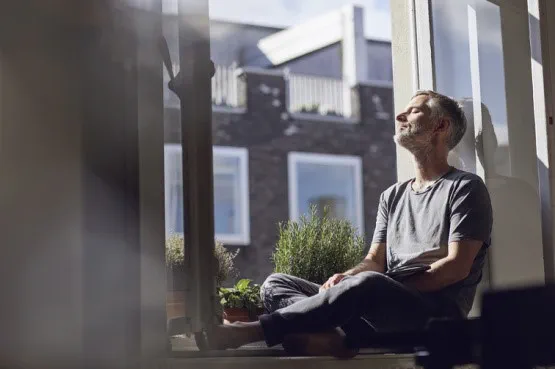Talking about men’s mental health
People of all genders can experience anxiety, depression, and other mental health issues. But research has found that men are less likely to access mental health support when they need it. That’s why it’s so important to raise awareness about men’s mental health.
In this article, I discuss some simple things you can do to encourage the men you know to speak out and get help when they need it.

How does mental health affect men?
We know that there are some specific trends and challenges related to men’s mental health in England. Research has found that:
- 1 in 8 men have a common mental health problem, such as depression or anxiety
- suicide is the most common cause of death for men under 50
In England and Wales 74 per cent of all people who commit suicide are men, and men aged 50 to 54 have the highest suicide rate of all age groups.
The above research has focused on cisgender men, who identify with the gender assigned to them at birth. Data on other groups is limited.
By talking about these problems, we can try and encourage more men to talk about their feelings and get support.
What stops men seeking mental health support?
There are many reasons why men may be reluctant to tell someone how they feel. For example, traditional gender roles and the expectations that society places on men can make it less likely for them to get help. These factors can also contribute to poor mental health.
The pressures on men to be ‘strong’ and less open with their emotions has created the feeling that seeking help is somehow ‘weak’. Other reasons why men don't seek help can include feeling embarrassed and not knowing where to start.
So, it’s really important to encourage the men you know to get support, which can help to overcome the stigma of opening up.
How can I start a conversation about mental health?
Try and normalise talking about mental health. Making the time to talk to a friend, colleague or family member can help people to feel a little better. And it may help them to take action and seek help for how they’re feeling.
You may spot someone in your life who is acting out-of-character. These three simple steps could encourage them to speak out.
- Check in. Simply asking how they are or mentioning any differences you’ve noticed in their behaviour may help. Don’t be afraid to ask more than once – ask, then ask again.
- Listen. Having asked if they’re ok, make sure you listen to them if they tell you what’s on their mind. Try not to worry if you don’t have the answers or struggle to give advice. Just listening and being there is really valuable.
- Reconnect. Make a plan together to catch up again soon. Knowing that they have someone who cares could help boost their mood.
How else can I support men’s mental health?
There are lots of helpful organisations that support men’s mental health that you can signpost others to, if needed. These include CALM (Campaign Against Living Miserably), Mind, Shout (Seeking Men’s Mental Health Support) and Samaritans.
There are also local groups, such as Men in Sheds and Andy’s Man Club, that can be a good source of support.
If you are non-binary, intersex or transgender, you might find it helpful to access support from LGBTQ+ support organisations, such as the LGBT Foundation and Mind Out.
There is so much value in the conversations we have with each other. Whether it’s your friend, brother, dad, or anyone else, let’s keep talking.
Our health insurance allows you to skip a GP referral in some cases, and speak to a mental health practitioner. Learn more today.
-
Sources Sources
- Men and mental health. Mental Health Foundation. mentalhealth.org.uk, last revised October 2021
- Men and women: statistics. Mental Health Foundation. mentalhealth.org.uk, accessed 13 November 2023
- Suicides in England and Wales: 2021 registrations. Office for National statistics. ons.gov.uk, released 6 September 2022
- Latest suicide data. Samaritans. samaritans.org, accessed 13 November 2023
- Get it off your chest: a report on men's mental health. Mind. mind.org.uk, accessed 15 November 2023
About our health information
At Bupa we produce a wealth of free health information for you and your family. This is because we believe that trustworthy information is essential in helping you make better decisions about your health and wellbeing.
Our information has been awarded the PIF TICK for trustworthy health information. It also follows the principles of the The Information Standard.

More mental health and wellbeing articles
Did you find our advice helpful?
We’d love to hear what you think. Our short survey takes just a few minutes to complete and helps us to keep improving our healthy lifestyle articles.
Legal disclaimer
This information was published by Bupa's Health Content Team and is based on reputable sources of medical evidence. It has been reviewed by appropriate medical or clinical professionals and deemed accurate on the date of review. Photos are only for illustrative purposes and do not reflect every presentation of a condition.
Any information about a treatment or procedure is generic, and does not necessarily describe that treatment or procedure as delivered by Bupa or its associated providers.
The information contained on this page and in any third party websites referred to on this page is not intended nor implied to be a substitute for professional medical advice nor is it intended to be for medical diagnosis or treatment. Third party websites are not owned or controlled by Bupa and any individual may be able to access and post messages on them. Bupa is not responsible for the content or availability of these third party websites. We do not accept advertising on this page.







